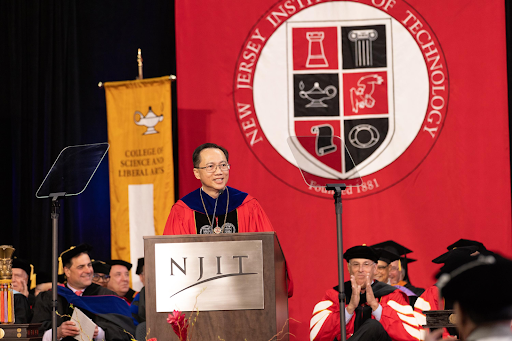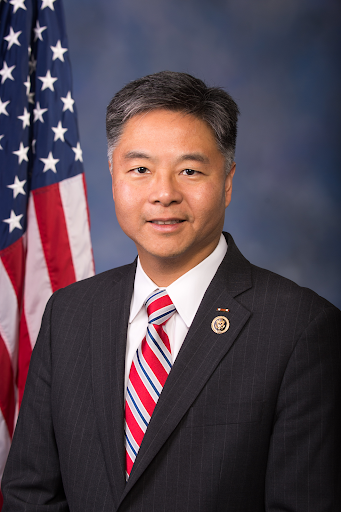Interview with Assemblyman Brian Bergen of District 25

March 12, 2023
It was a great privilege to converse with Assemblyman Brian Bergen of District 25, who has a proud history of both military and government service. Assemblyman Bergen is the epitome of a war hero – after graduating from the US Military Academy at West Point, he led a distinguished career as a helicopter pilot and company commander in Iraq, where he received a Bronze Star and Combat Action Medal. During our conversation, we discussed his personal experiences serving in Iraq and the impact it had on him, as well as current events and initiatives in New Jersey. Additionally, I sought advice from Assemblyman Bergen on how high school students can become involved in public affairs, and voiced my personal support of Bill AJR201, which seeks to officially recognize Lunar New Year in NJ.
(For the purposes of clarity, certain elements of the interview have been revised. This transcript has been reviewed and approved by Assemblyman Bergen and his office.)
Ziran (Rachel) Yuan (Reporter for The Devil’s Advocate): How did your military experience in Iraq shape how you see the world?
Assemblyman Bergen: I think being in Iraq and serving in a wartime capacity, first of all, made me dislike war. I mean, there’s nobody who wants to go to war less than somebody who’s been in war before. In terms of worldview, it really gave me a significant amount of empathy for the way people live across the world. We travel on vacations to see other parts of the world. We often go to the places that are nice and where the tourist attractions drive us. We like to see the Eiffel Tower or the pyramids in Egypt, but you don’t often get to see the parts of the world where people are really, really hurting. When I was in Iraq, I got to see that firsthand, you know, a country that was struggling to implement a democracy. And then I saw people there that were struggling, too. I’ll never forget on my convoy trip up from Kuwait to Baghdad. I have a picture somewhere of, oh, a young girl and boy running up the street to see us as we passed by and they came up to the barbed wire and they were in like a rough looking desert area. They had no shoes on. It just really makes you have empathy for people throughout the world and have an appreciation, quite frankly, of what we have in the United States.
RY: Federal data of New Jersey depicts a consistently decreasing population since the pandemic. Why do you think this is happening?
Assemblyman Bergen: The high cost of living is the biggest driver. By every other metric, New Jersey rates are relatively high – in terms of our school system, location, ability to travel to different places in the region, and easy access to jobs, New Jersey rates very high. However, the cost of living in New Jersey outweighs even all those incentives.
RY: What can NJ do about this high cost of living?
Assemblyman Bergen: What we can do as a state and as a legislative body is take actions to reduce the cost of living here through a reduction in the tax burden. One day, you’ll see that property taxes are really the biggest burden on every single person and our government doesn’t do enough to reduce those property taxes. And when they do, it’s often a gimmick. It’s something short term that looks good,or people like, but that doesn’t really fundamentally solve the problem. Until they fix that, people are going to continue to leave for other places.
RY: Why are taxes such as property taxes so high in NJ?
Assemblyman Bergen: Well, one of the primary reasons is the cost of education. So if you took your property tax bill or your parents’ property tax bill, about 70% of the entire tax bill your parents pay a year for property taxes goes to the school system. So let’s say they pay $15,000 a year in property taxes – that’s about $12,000 a year just for the schools. It’s crazy. And then out of the remaining 30%, half of it goes to your county government so they can do all the county functions, like supporting the sheriff’s office and the parks, and the other half, only 15%, goes to pay the police officers, the fire department, and the DPW workers that take care of your town. You would think that the cost of all the police and fire stations and bridges and the roads would be more of a share of your property taxes. But generally speaking, it’s education. So we need to look at our education sectors, how much they spend, why they spend it and possibly encourage them to consolidate districts so that there are less overhead costs in the administration. We also need to do the same thing with municipalities. For example, maybe your town could share a court with another town so that they don’t have to have two courts. By doing these things, we can drive the costs down.
RY: One more policy question – Bill AJR201, which was recently introduced in the NJ General Assembly, seeks to officially recognize Lunar New Year in NJ. What are your thoughts about this bill?
Assemblyman Bergen: I think that’s a great cause. I would support that. I can help you find other people who would as well. And the fact that you’re this engaged and willing to talk to me makes me happy. You know, that there’s people that really care about what we do and you should be very proud of yourself. I’m very proud of you.
RY: Last question. Do you have any advice for high schoolers or other young people who wish to participate in public affairs?
Assemblyman Bergen: Call us, talk to us. Reach out. I’m happy to talk to youths about any issue.








